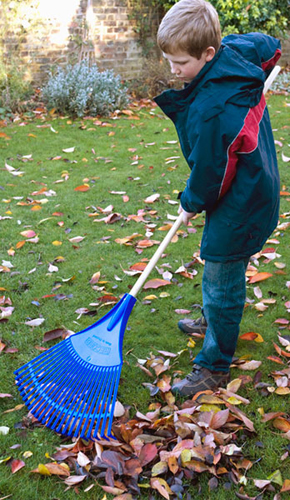| Q: |
My son keeps saying everyone at school gets more freedom than
him. Am I really as out of step with other parents as he says?
| | A: |
Your child is using a common and powerful negotiating tool, that
of making comparisons with other parents and children. This can be very
helpful, as it is prompting you to consider the freedoms you give him
and check whether you are being reasonable. However, don’t make your
decisions based on just his report. Check out what is acceptable for his
age by talking with other parents directly, be guided by developmental
information in books, and think through the values and standards you are
applying. Once you’ve gathered this information, decide whether you are
prepared to loosen the limits or stick with them. Remember—no matter
what you decide, you are in a process of fostering his independence, so
freedoms need to be reviewed regularly and adjusted to allow him to make
more choices for himself.
|
| Q: |
My partner says I am too hard on the children. I think he’s too soft. Who’s right?
| | A: |
Very different parenting approaches can be frustrating for both
of you, and may mean your child plays you against each other. There is
no single correct parenting style. However, consider what your child is
learning from each of you. Is he finding he must be manipulative to get
what he wants or that it’s okay for adults to disregard and contradict
each other? Whatever he learns he may apply in his own relationships
outside the home. Consider what you want to teach him. For example, you
may wish to show him that adults are respectful of each others’
decisions and that he can have a say in what happens through negotiating
rather than by finding a way around the rules. As you loosen control
and include your child in decision making, he’ll learn his views are
valued. Similarly, if your partner finds it hard to judge when to give
in or stand firm, help him out by talking together about what you’ll do.
When you model respect for each other and the ability to compromise,
your son will follow in your footsteps.
|
| Q: |
My child’s bedroom is a bombsite. How can I get her to clean it up?
| | A: |
Your child’s bedroom is her special space in the home, somewhere
to express her personality and have her privacy. It can also be a
gigantic mess. Before you take action about the state of your child’s
room, think about whether this is your problem. If it’s not, then simply
close her bedroom door and accept she has chosen to live this way. You
may, however, feel she needs to learn neater habits or address health or
cleanliness hazards, such as spoiled food or toys to trip over. If so,
blitz the bedroom with a big tidy up. Do this together with your child,
or she’ll feel her privacy has been violated. Next, agree some rules,
such as, “The floor will be cleared of toys each night,” and, “Put dirty
clothes in the laundry basket daily.” Lastly, notice and praise your
child for any acts of tidiness and, of course, set a good example
yourself and keep your own bedroom tidy.
|
| Q: |
I constantly remind my daughter to do her chores, yet she does nothing. What can I do?
| | A: |
For you and your daughter, it seems an unhelpful cycle of “you
ask and she resists” has developed. In this situation the focus has
moved from the chore itself to a battle of wills between the two of you.
She may feel
your constant reminders mean you don’t trust her, while her lack of
effort builds your frustration. Break the cycle by avoiding the urge to
nag: You know it doesn’t work. Instead, find out from your child what
gets in the way of her completing her tasks and ask her, if she was in
your shoes, how she’d solve the problem. Children can be surprisingly
insightful about what would motivate them. You may explore hidden
reasons for her behavior—perhaps her favorite show is on at the time she
is supposed to clear the table, or she hates the smell of the cat food
she has to dish out. Find solutions together, such as changing the
timing of tasks or feeding the animals together so you do the part of
the job she can’t handle. Take the burden of reminding her off your
shoulders by using a kitchen timer or a poster to jog her memory. If
these don’t work agree, to fire off a single reminder yourself, such as a
text, to get her going. Bump up her motivation by changing the reward
for her chores. Perhaps she’s lost interest in the original incentives
you offered. A different privilege, such as choosing the Friday-night
takeout meal or movie, or a small monetary reward may get her started.
If she doesn’t help out despite all this effort, then some consequences,
such as missing out on rewards and privileges, will need to be used.
|
| Q: |
Can I take back money earned from chores if my child misbehaves later?
| | A: |
Offering money as a reward for jobs done is a good incentive and
gives you the option of withholding small sums if tasks don’t get
completed. However, it is unwise to take back the money your child has
earned through chores for unrelated misbehavior. If you do this, then
you teach him that, no matter how hard he works, he may not be rewarded.
He’ll recognize this is unfair, and may give up on his chores as a
consequence. Do make chore money separate from regular pocket money.
This way you can use pocket money as a reward for good behavior and hold
it back it for misbehavior without affecting your child’s incentive for
doing his chores.
|
| Q: |
My children hardly help out at all right now. How can I get them started with housework?
| | A: |
Give a clear reason why chores need to be shared—perhaps explain
that when everyone helps at home then there will be more time to have
fun together. Give a specific example of something you’ll do as a family
if chores are shared, or your children may not be convinced.
Create a list of jobs
that need to be done each day, and encourage your child to say which
ones she’d prefer. She’ll be more likely to do her chores if she has
helped to make the list and chosen her own tasks. When chores are linked
to her personal interests, you’ll get better cooperation too. For
example, if she’s begged for a pet, then her task could involve the
animal’s care. If she takes pride in her personal space, you could
encourage her to choose vacuuming her bedroom as one of her jobs. Your
sports-obsessed child may be willing to sort the laundry into whites and
colors if this helps get her uniform washed first.
For you, the
incentive to complete a task may be the satisfaction of a job well done
or seeing tidiness after chaos. However, your child has probably not yet
developed this sense of personal fulfillment, and external rewards are
needed to keep her going. Spend some time with your child making a list
of rewards from which she can choose; but do put limits on cost or time
commitment so you don’t have to say “no” to too many fanciful or
expensive suggestions. Activities and privileges tend to work well—for
example, earning a later bedtime on weekends, an extra family outing, or
her choice of Sunday lunch. A sticker chart showing she’s completed her
chores can be motivating, and small monetary rewards are useful, since
you’ll be able to teach your child about spending and saving as she
earns. However, even the most prized reward loses its appeal after a
while. Changing rewards regularly keeps your child’s motivation up.
Write out a job roster, to show who will do each chore on each day. This
helps your child see that tasks are being allocated fairly, and
everyone is playing his or her part. Rosters act as a reminder of what
is needed, and you can check off each item as it’s completed. The tally
also helps you allocate rewards for jobs done.
Your aim is to teach your
child to take a small share in running the household, so identifying
one or two brief daily tasks works well and helps establish a routine.
Choose the tasks you give your child with care, since her concentration
and ability to recognize and manage risks are not fully developed yet.
|
Less directive, more reflective
As your child matures, your own parenting style is adjusting along with her growing independence.
You will be less likely to tell her what to do and more often be
offering advice and support as she comes to her own conclusions. Your
child will learn through her own experience and rarely accept that she
can learn from yours. While it can be hard to stand by and not
interfere, there will be times when it’s safe to let her make her own
mistakes. If things do end in tears make sure you’re ready with a
sympathetic attitude and no “I told you so” to be heard.
Chores: benefits for everyone
Chores are tasks around
the home that benefit everyone in the family—for example, setting the
table or putting away clothes. Chores should not be confused with your
child’s everyday responsibilities such as getting his cereal in the
morning and packing his school bag. Both chores and responsibilities are
important to your child’s development. Learning to look after himself
and carry out domestic tasks are part of the life skills he needs to
become an independent adult.
| Q: |
What do you expect?
| | A: |
Your child has plenty of demands on his time. When he’s at home
he needs opportunities to do his homework, play with friends, and relax,
as well as helping around the house. There is no set or correct number
of chores to give at each age, so it is up to you to make sure he is not
overwhelmed with tasks. Gauge what he can do depending on his school,
sports, and other obligations. Start small, perhaps with a 10-minute
commitment every day, as it is more effective to build up from there
than find he’s snowed under and have to back down. Make sure he is ready
for the tasks he takes on.
While he’ll be able to
complete simple jobs such as tidying his room or putting his dirty
clothes in the laundry basket, he may need some help learning more
complex tasks. Build his competence and confidence by teaching him to
use household appliances—for example, how to work the vacuum attachments
or microwave. An ideal way to teach is to complete the chores together
until he gets the hang of them.
|


NOTE
Children who regularly help around the home are more likely to be prepared for their adult life
|